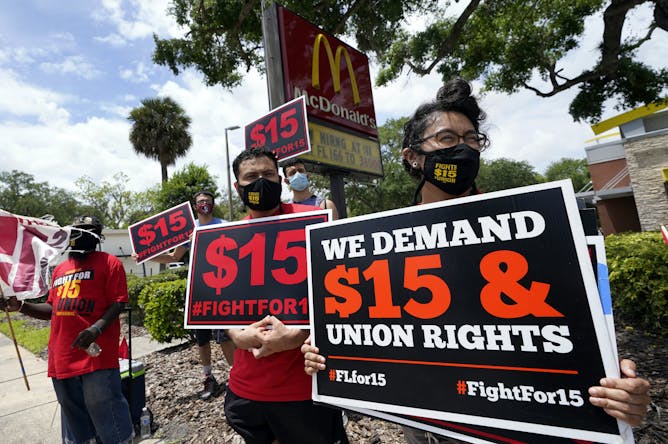+ teaching kids to be creative
| | | | Politicians, activists and economists have been fighting over the minimum wage for well over a century – at least since Massachusetts became the first state to create one in 1912. But while politicians and activists may base their support or opposition to a policy on belief, economists are supposed to ground their views in data. The problem is economics involves the study of human behavior, which is notoriously hard to measure in a rigorous way, explains economist Veronika Dolar. So economists frequently turn to theory, models and abstraction to answer important questions, like whether raising the minimum wage will kill jobs. And this is why for decades most economists insisted the answer must be "yes." One of this year's winners of the Nobel Prize in economics upended that theory-based consensus with a novel way to see the real-world effects of a minimum wage hike – changing the field of economics in the process, Dolar writes. Also today: Scrutinizing Georgia's 150-year-old citizen arrest law Turning work from home into an opportunity for rural communities Does chewing ice damage your teeth? |  | Bryan Keogh Senior Editor, Economy + Business | |  The fight over the minimum wage continues. AP Photo/John Raoux Veronika Dolar, SUNY Old Westbury The question is actually one of the most studied in all of economics and still doesn't have a definitive answer – though Nobel-winning economist David Card got us closer. | Politics + Society | -
Seth W. Stoughton, University of South Carolina Three men who pursued a black jogger who died of a shotgun wound in the confrontation claim they were trying to conduct a citizen's arrest. | | Environment + Energy | -
Hillary A. Brown, City College of New York; Daniel R. Brooks, University of Toronto If rural communities plan carefully – and some already are – they can reinvent themselves as the perfect homes for people fleeing wildfire and hurricane zones. -
Sula E Vanderplank, San Diego State University Mangroves grow in saltwater along tropical coastlines, but scientists have found them along a river in Mexico's Yucatan, more than 100 miles from the sea. Climate change explains their shift. | | Education | -
Charles Bell, Illinois State University Teachers say school districts have left them in the lurch in the wake of attacks by students. Some admit they resort to violence themselves to send a message to students who might want to test them. -
James C. Kaufman, University of Connecticut Art classes and STEM toys are nice, but there are simple and free ways parents can encourage their child's creativity – or keep it from getting squashed. | | Health | -
Matthew Cooke, University of Pittsburgh Health Sciences A dentist explains why this is a habit worth breaking – no matter the cause or the strength of your cravings to keep doing it. | | | | Trending on site | -
Kristina Scharp, University of Washington There is a common misconception that family estrangement is a particular event or outcome. Rather, it's often based on ongoing issues. -
Jeffrey R. Aeschlimann, University of Connecticut Ivermectin has been a lifesaving drug for people with parasitic infections like river blindness and strongyloidiasis. But taking it for COVID-19 may result in the opposite effect. -
Chris Impey, University of Arizona The James Webb Space Telescope is set to launch into orbit in December 2021. Its mission is to search for the first light to ever shine in the universe. | | | | | | | | | | | | | | | | | | | | |
